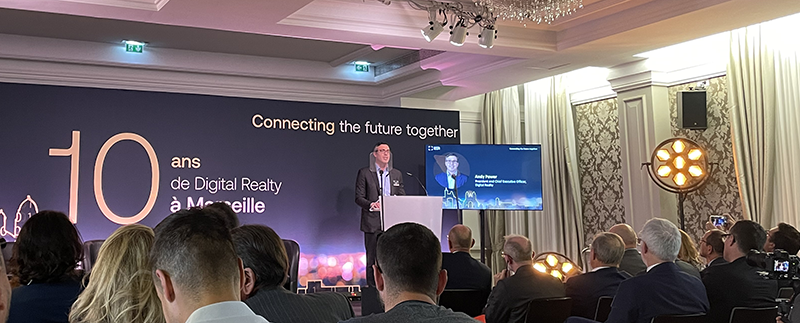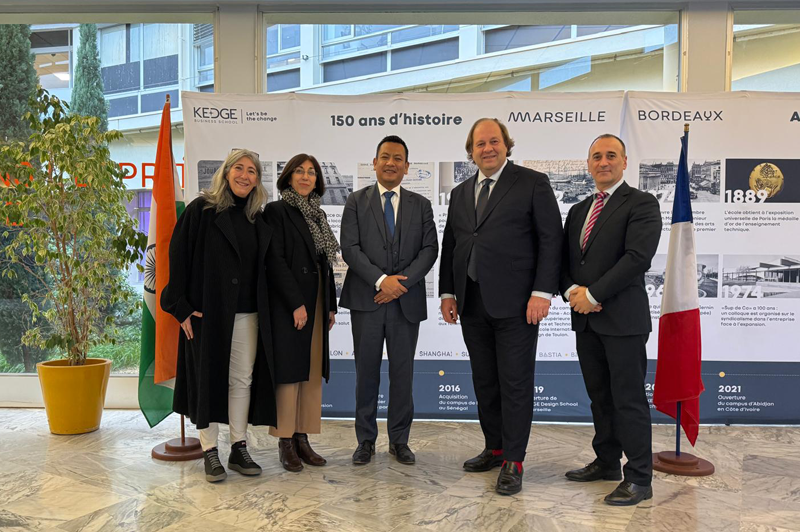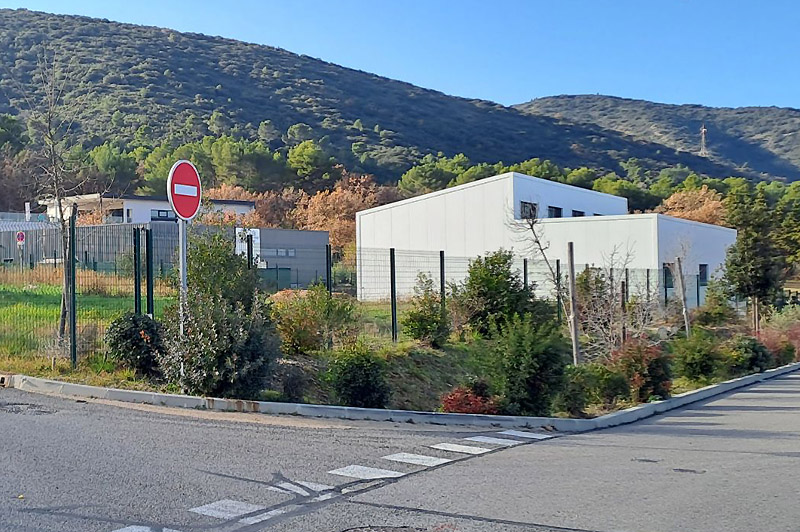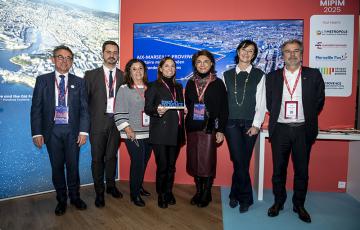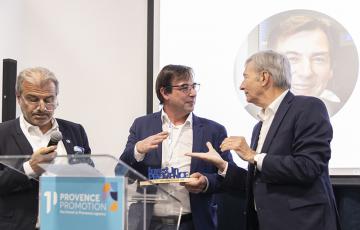Digital Realty Celebrates a Decade of Investment and Innovation in Marseille
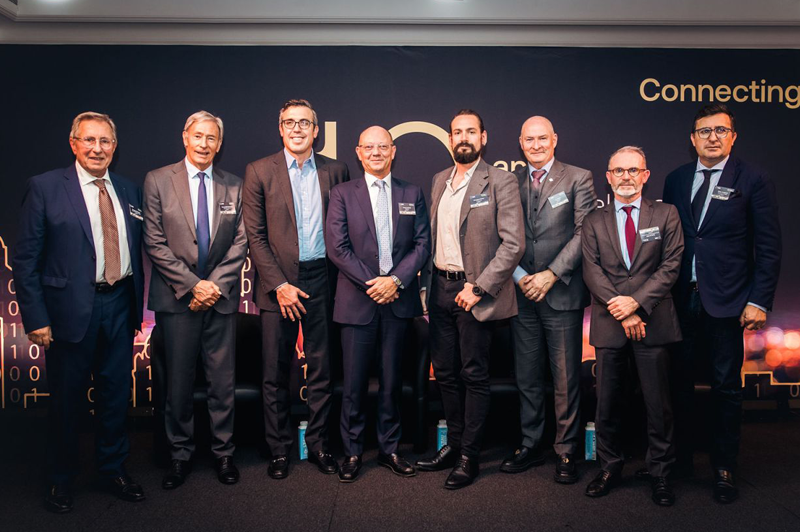
A proud commitment to combining economic growth with digital responsibility
Since Interxion, which became Digital Realty in 2020, first got involved in the data center business in Marseille, the city has been transformed into a leading global internet hub. With more than €400 million in investments over the past decade, there are now four Digital Realty data centers operating and a fifth, the MRS5, is planned for 2026. This success was celebrated on Tuesday, October 29, at the Palais du Pharo and then at the Villa Gaby, in the presence of Andy Power, CEO of the American company, and Lex Coors, its Chief Datacenter Technology and Engineering Officer. Fabrice Coquio, Senior Vice President and Managing Director at Digital Realty France, thanked his teams and the Aix-Marseille ecosystem for contributing to the success. He also outlined the company’s plans for the next ten years, which will include a focus on technological innovation and a Corporate Social Responsibility approach that fosters responsible digital development.
In the span of ten years, Marseille has climbed from 44th to 7th among the world’s top internet hubs. And Digital Realty, a world leader in data centers, colocation facilities, and interconnection solutions, is confident the city will play an even greater role at the heart of the information superhighway in the future. In his speech at the celebration of the company’s ten-year anniversary in Marseille, Fabrice Coquio said the success of the city and Digital Realty is a reflection of the complementary partnerships established between stakeholders in the submarine cables systems, land networks, the Port of Marseille Fos, and local governments.
Interxion originally purchased a data center in Marseille from SFR, which it renamed MRS1. Starting in 2015, a €220-million-investment program was launched to build three more data centers, projects that Provence Promotion supported by establishing connections between the company and the Port of Marseille Fos. This collaboration has enabled the company to strengthen its territorial roots and take advantage of Marseille's geostrategic assets.
Today, Marseille is a key pillar in the global data structure. “Our investments are significant because we firmly believe Marseille will be a global connectivity hub for decades to come,” said Andy Power, the CEO of Digital Realty. “There won’t be a ‘next Marseille’, and that’s good news,” added Fabrice Coquio, who emphasized the city’s superb strategic position as a landing point for 18 undersea cables, an advantage that will only increase as six new cables are to be completed within the next two years.
A 10-year plan and a vision for the development of data centers in Marseille
As part of the company’s Connecting the Future Together anniversary celebration in Marseille, Digital Realty presented its outlook in the context of a rapidly transforming market. To keep pace with the exponential growth in internet traffic, the company is committed to providing the required infrastructure for new data storage, processing, and analysis. This infrastructure will meet the needs of cloud computing platforms and artificial intelligence applications, two areas of enormous strategic importance when it comes to France’s economic sovereignty.
Currently being constructed in the Port of Marseille-Fos zone on the site of a former sugar silo of the Saint Louis Sucre factory, Digital Realty’s new MRS5 data center will offer 40% more computing power than the four other data centers combined. This €300 million investment will also attract companies and generate more employment. Over the past ten years, 500 jobs have been created through the company’s investments, including 100 direct jobs, and 200 new jobs are planned.
Connected to 57 countries and reaching more than five billion users worldwide, Marseille will join the Top 5 of the world’s best-connected cities in 2026. Its leading position is being reinforced by the emergence of digital hubs across the Mediterranean, such as Barcelona, Rome, Athens, Heraklion, and Tel Aviv, which enable Marseille to play an even more central role in data exchanges between countries in Europe, Africa, Asia, India, and the Middle East.
Digital Realty targets responsible economic growth
Marseille has the advantage of being a relatively new hub, so it has been designed according to state-of-the-art standards and technologies. For example, Frankfurt, the world’s leading hub, uses 100 hectares for its data centers while Marseille devotes just 4 hectares to them, all on former industrial wastelands. The density of these installations combined with the company’s green technological innovations, such as the River Cooling system that uses groundwater for cooling computer racks and is 30 times more energy-efficient than conventional methods, makes Marseille’s infrastructure extremely attractive.
To meet the challenges of responsible digital development, Marseille’s data centers operate mainly with renewable energies, thanks to power purchase agreements (PPA), and MRS5 will use exclusively green energy sources. Innovative solutions for recovering waste heat are also being developed: the thermal energy released by the site could be used to supply the urban heating network.
Finally, in parallel with the company’s community involvement program, which includes support for culture and the preservation of biodiversity, Digital Realty is involved in training initiatives and professional integration programs. The aim is to create genuine opportunities for employment by helping to deliver the skills that meet the needs of the ecosystem. The company is also working with local governments to improve the quality of life of residents. This is all part of Digital Realty’s goal of implementing a holistic business model that fully incorporates social and environmental considerations by 2030.



 +33 4 96 11 60 00
+33 4 96 11 60 00





